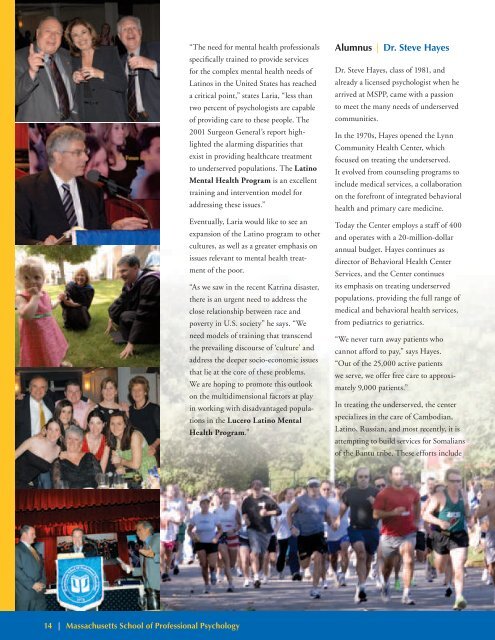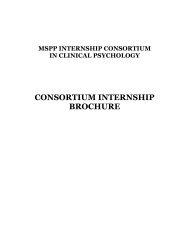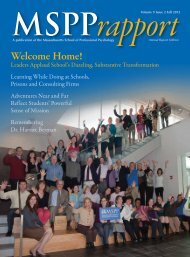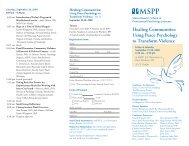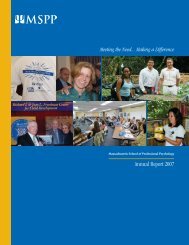College - Massachusetts School of Professional Psychology
College - Massachusetts School of Professional Psychology
College - Massachusetts School of Professional Psychology
Create successful ePaper yourself
Turn your PDF publications into a flip-book with our unique Google optimized e-Paper software.
“The need for mental health pr<strong>of</strong>essionals<br />
specifically trained to provide services<br />
for the complex mental health needs <strong>of</strong><br />
Latinos in the United States has reached<br />
a critical point,” states Laria, “less than<br />
two percent <strong>of</strong> psychologists are capable<br />
<strong>of</strong> providing care to these people. The<br />
2001 Surgeon General’s report high-<br />
lighted the alarming disparities that<br />
exist in providing healthcare treatment<br />
to underserved populations. The Latino<br />
Mental Health Program is an excellent<br />
training and intervention model for<br />
addressing these issues.”<br />
Eventually, Laria would like to see an<br />
expansion <strong>of</strong> the Latino program to other<br />
cultures, as well as a greater emphasis on<br />
issues relevant to mental health treat-<br />
ment <strong>of</strong> the poor.<br />
“As we saw in the recent Katrina disaster,<br />
there is an urgent need to address the<br />
close relationship between race and<br />
poverty in U.S. society” he says. “We<br />
need models <strong>of</strong> training that transcend<br />
the prevailing discourse <strong>of</strong> ‘culture’ and<br />
address the deeper socio-economic issues<br />
that lie at the core <strong>of</strong> these problems.<br />
We are hoping to promote this outlook<br />
on the multidimensional factors at play<br />
in working with disadvantaged popula-<br />
tions in the Lucero Latino Mental<br />
Health Program.”<br />
Alumnus | Dr. Steve Hayes<br />
Dr. Steve Hayes, class <strong>of</strong> 1981, and<br />
already a licensed psychologist when he<br />
arrived at MSPP, came with a passion<br />
to meet the many needs <strong>of</strong> underserved<br />
communities.<br />
In the 1970s, Hayes opened the Lynn<br />
Community Health Center, which<br />
focused on treating the underserved.<br />
It evolved from counseling programs to<br />
include medical services, a collaboration<br />
on the forefront <strong>of</strong> integrated behavioral<br />
health and primary care medicine.<br />
Today the Center employs a staff <strong>of</strong> 400<br />
and operates with a 20-million-dollar<br />
annual budget. Hayes continues as<br />
director <strong>of</strong> Behavioral Health Center<br />
Services, and the Center continues<br />
its emphasis on treating underserved<br />
populations, providing the full range <strong>of</strong><br />
medical and behavioral health services,<br />
from pediatrics to geriatrics.<br />
“We never turn away patients who<br />
cannot afford to pay,” says Hayes.<br />
“Out <strong>of</strong> the 25,000 active patients<br />
we serve, we <strong>of</strong>fer free care to approxi-<br />
mately 9,000 patients.”<br />
In treating the underserved, the center<br />
specializes in the care <strong>of</strong> Cambodian,<br />
Latino, Russian, and most recently, it is<br />
attempting to build services for Somalians<br />
<strong>of</strong> the Bantu tribe. These efforts include<br />
providing services from healthcare pro-<br />
fessionals <strong>of</strong> that culture, who speak the<br />
language and conduct staff training.<br />
Hayes says that MSPP is on target with<br />
its focus on the underserved, as well as<br />
the quality training given by MSPP.<br />
“Our center only accepts MSPP students<br />
for our psychology internships and post-<br />
doc fellowships due to their maturity<br />
level and solid prior training,” he adds.<br />
Hayes readily admits that he loves his<br />
pr<strong>of</strong>ession and is very thankful to MSPP<br />
for how conscientiously it is fulfilling<br />
| <strong>Massachusetts</strong> <strong>School</strong> <strong>of</strong> Pr<strong>of</strong>essional <strong>Psychology</strong> Annual Report 2005 | 5<br />
its mission.<br />
Alumna | Dr. Lisa Gurland<br />
Dr. Lisa Gurland has reached her pr<strong>of</strong>es-<br />
sional pinnacle. With great passion, she<br />
explains, “I am already doing more with<br />
my career than I ever imagined.”<br />
Gurland’s passion is especially exempli-<br />
fied in her role as director <strong>of</strong> Behavioral<br />
Health Planning and Development on<br />
Disaster Preparedness at the Massachu-<br />
setts Department <strong>of</strong> Public Health, where<br />
she has provided expertise on a variety <strong>of</strong><br />
public health concerns since 1988.<br />
In addition to disaster preparedness,<br />
she has worked in the area <strong>of</strong> communi-<br />
cable diseases, diversity awareness, and<br />
training and consultation for program<br />
development. “On bio-terrorism, there<br />
is much work with local communities,<br />
hospitals and first-line providers, as<br />
well as drills and training to educate<br />
each other,’ she says. ‘Regarding disaster<br />
preparedness, the work is primarily to<br />
develop relationships between providers—<br />
hospitals, local communities and state<br />
and federal agencies through practice<br />
drills and integrated training programs.<br />
We can’t learn from each other if we<br />
don’t know each other.”<br />
According to Gurland, following Hur-<br />
ricane Katrina, more than 200 people<br />
arrived in <strong>Massachusetts</strong> from New<br />
Orleans. “We are learning how to meet<br />
the behavioral health needs <strong>of</strong> people<br />
who are traumatized on many levels.<br />
We are also learning how to take care <strong>of</strong><br />
each other as providers. It is a necessary<br />
and complicated task.”<br />
Coming to MSPP as a psychiatric nurse,<br />
and graduating in 1985, Gurland feels<br />
MSPP made a tremendous difference in<br />
grounding her in theory and practice.<br />
“I especially found the supervisors’<br />
courses and community mental health<br />
classes <strong>of</strong> great assistance,” she says.<br />
With her commitment to public<br />
health, Gurland is pleased with the role<br />
MSPP is playing in the community, not<br />
just as an institution, but a team player<br />
with other institutions who are all<br />
making a difference.


